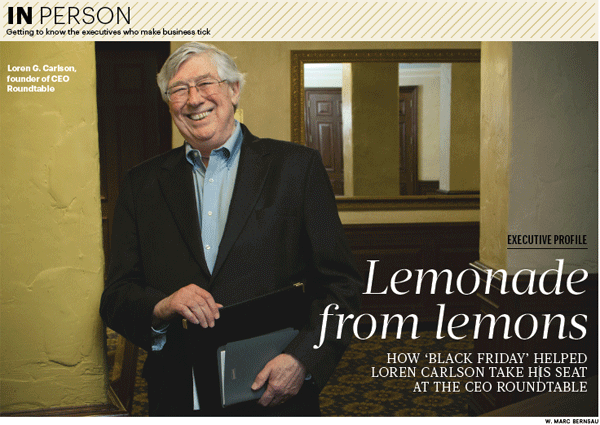CEO Roundtable's Blog

The Most Powerful Room a CEO Can Be In
"It’s not about ego. It’s about execution." Whether you're leading a $2M business or a $250M one, the real edge isn’t in knowing all the answers. It’s in finding the right room where you don’t have to. In this powerful interview, Stephanie Kord Miller describes what...

Why I Do This Work
Written by Scott C. Lewis Our CEO peer groups get to meet for just a few short hours each month but it amazes me how much ground we can cover. In each meeting, we might explore a mix of tactical issues like hiring and firing, taxation or cash flow; strategic issues...

Meet CEO Roundtable Member: Dave Todaro, Founder and Chief Executive Officer of Ascendle
At CEO Roundtable, we celebrate the leaders driving innovation, impact, and growth. Meet Dave Todaro, a veteran technologist and product strategy expert with over two decades of experience guiding agile software teams. As the Founder and CEO of Ascendle, Dave blends...

How a Peer Group Helped Me Stay Grounded Through the Toughest Chapter of My Career
Member Experience Shared By Jessica Ballinger, CEO Roundtable member and former biotech CEO When Jessica stepped into the CEO seat, she knew she wanted a support system that could meet her where she was: in the arena, making the big calls, with people counting on her....

Beyond Business: What Loren Carlson Taught Me About Leadership and CEO Roundtable
Written by Scott Lewis This past Saturday, I attended a celebration of the life of Loren Carlson, founder of CEO Roundtable, alongside a dozen past and present CEO Roundtable members, as well as countless family and friends. It was a powerful reminder of the impact...

If AI is no longer optional, where should you start?
Written by Umair Aziz, Managing Partner of Creative Chaos Artificial intelligence is no longer a futuristic idea or a Silicon Valley experiment. It’s here, it’s real, and it’s already changing how work gets done - at every level of the business. Yet, for most small...

Rethinking Heavy Machinery: How RISE Robotics Is Powering the Future Without Hydraulics
In Somerville, Massachusetts, RISE Robotics, led by CEO and CEO Roundtable member Hiten Sonpal, is redefining the future of heavy machinery. Their breakthrough technology, Beltdraulics, replaces traditional hydraulic systems with an elegant solution built on belts and...

Real-World Impact: How CEO Roundtable Member Steve Farrington is Advancing Flood Preparedness
At CEO Roundtable, we celebrate members making a tangible difference in their industries and communities. Today, we’re shining a spotlight on Steve Farrington, whose innovative approach to real-time flood alerts is helping residents stay ahead of rising waters. His...

How CEO Roundtable Helped Me Unlock Growth and Confidence
Member Experience Shared By Lisa Tugal, Owner & CEO of Bellwether Bookkeeping For the first 15 years of running Bellwether Bookkeeping, I was doing it all. Every decision, every client, every challenge, I tackled it alone. As my business grew. I hit a wall. I knew...

CEO Roundtable All Hands: Unlock Your Next Chapter: Insights from Exited CEOs
The Journey of Transition: Highlights from the All-Hands Our conversation brought together a dynamic group, including Carol Bergeron, Dan O’Brien, Ryan Thomas, and Scott Lewis to explore what CEOs face during life-changing transitions. Here’s what we covered: The...

CEO Roundtable is made up of private, peer advisory groups of 8 to 12 members from non-competing companies. These peer groups provide a forum for invigorating exchanges of information, ideas, and insights.

